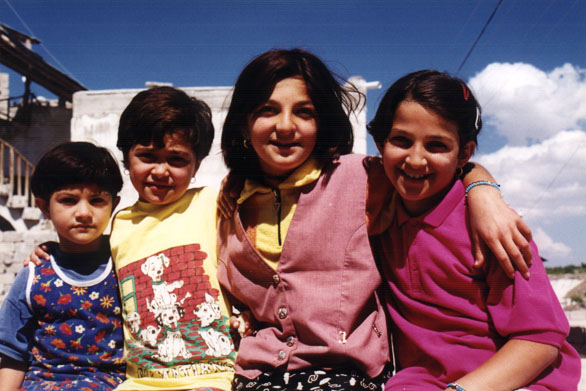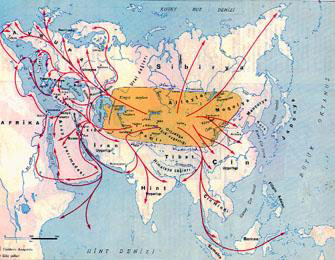Re: An open message from an Iranian-Azerbaijani
That's false, in Iran, Azaris are not called "Torks", they are called "Azari".
No one says "bevin een marde Torki" they say "bevin een marde Azari".
I don't like being accused of being a liar, please back up your point. I am also very surprised that you as an Azeri would prefer to be called a Turk, I have encountered many Turks who try to play off as being Azerbaijani for their own personal gain, are you one of them?
The following is a post I made in another thread, just re-emphasizing factual information that has been known by Iranian and Azerbaijani intellectuals for years:
Northern Azerbaijanis celebrating Nowruz (a traditional Iranian celebration marking the Persian new year):
Azerbaijani website glorifying the Iranian celebration of Nowruz:
Azerbaijani men and women dancing in traditional clothes, akin to cultures of the Caucasus:

Young Azerbaijanis with normal Iranian phenotypes:

1. "Encyclopedia Iranica. C. E. Bosworth. Arran". Retrieved 2009-06-29.
2. Roy, Olivier (2007). The new Central Asia. I.B. Tauris. p. 6.
3. "Encyclopedia Iranica, "Mannea", by R. Zadok".
4. "Maziar Ashrafian Bonab", Department of Genetics, University of Cambridge . Retrieved 9 June 2006.
5. "Cambridge Genetic Study of Iran", ISNA (Iranian Students News Agency), 06-12-2006, news-code: 8503-06068 . Retrieved 9 June 2006.
Originally posted by Qaradagh
No one says "bevin een marde Torki" they say "bevin een marde Azari".
I don't like being accused of being a liar, please back up your point. I am also very surprised that you as an Azeri would prefer to be called a Turk, I have encountered many Turks who try to play off as being Azerbaijani for their own personal gain, are you one of them?
The following is a post I made in another thread, just re-emphasizing factual information that has been known by Iranian and Azerbaijani intellectuals for years:
In the 11th century A.D. with Seljukid conquests, Oghuz Turkic tribes started moving across the Iranian plateau into the Caucasus and Anatolia. The influx of the Oghuz and other Turkmen tribes was further accentuated by the Mongol invasion.[1] Here, the Oghuz tribes divided into various smaller groups, some of whom – mostly Sunni – moved to Anatolia (i.e., the Ottomans) and became settled, while others remained in the Caucasus region and later ... from 13th century onwards they gradually Turkified the Iranian-speaking populations of Azerbaijan, thus creating a new identity based on Shiism and the use of Oghuz Turkic. However, it is notable that the Turkification of Azaris was completed only by the late 1800s, while the old Iranic speakers can still be found in tiny isolated recesses of the mountains or other remote areas (such as Harzand, Galin Guya, Shahrud villages in Khalkhal and Anarjan). Today, this Turkic-speaking population is also known as Azeris.[2]
The Iranian origins of the Azeris likely derive from ancient Iranic tribes, such as the Medes in Iranian Azarbaijan, and Scythian invaders who arrived during the eighth century BCE. It is believed that the Medes mixed with Mannai.[3]
A recent study of the genetic landscape of Iran was completed by a team of Cambridge geneticists led by Dr. Maziar Ashrafian Bonab (an Iranian Azarbaijani).[4][5] The study found that the Azerbaijanis of Iran do not have a similar FSt and other genetic markers found in Anatolian and European Turks. However, the genetic Fst and other genetic traits like MRca and mtDNA of Iranian Azeris were identical to Persians in Iran.
Azerbaijani website glorifying the Iranian celebration of Nowruz:
Azerbaijani men and women dancing in traditional clothes, akin to cultures of the Caucasus:

Young Azerbaijanis with normal Iranian phenotypes:

1. "Encyclopedia Iranica. C. E. Bosworth. Arran". Retrieved 2009-06-29.
2. Roy, Olivier (2007). The new Central Asia. I.B. Tauris. p. 6.
3. "Encyclopedia Iranica, "Mannea", by R. Zadok".
4. "Maziar Ashrafian Bonab", Department of Genetics, University of Cambridge . Retrieved 9 June 2006.
5. "Cambridge Genetic Study of Iran", ISNA (Iranian Students News Agency), 06-12-2006, news-code: 8503-06068 . Retrieved 9 June 2006.











Comment